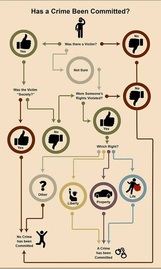Hearkening back to “Towards a Definition of Anarchy”, I denounce any institution predicated on or constructed for the sake of coercion, murder, or theft. For now, we will simply define “government” as the very same. Between laws enforced by men with guns threatening murder or imprisonment and theft in the form of taxes, fines, and regulations, it is clear that the common conception of government fits the bill. What are the differences between an individual criminal engaging his victim in a state of war and an institution of thousands of individuals doing so?
The first difference, as will be apparent from readers' gut reaction to the above statement, is one of public opinion. A random individual pointing a gun in someone's face because “Smoking is bad for you” would be publicly reviled and may even be stopped by a third party. However, a man in a blue shirt and a shiny badge pointing a gun at someone for smoking is hailed as a hero and many would likely come to his aid if the victim were to defend himself. Admittedly, public opinions on weed are shifting (and the opinion on tobacco is shifting the opposite direction), but public opinion on law enforcement is not. The same holds true for taxation (because you live within an arbitrary cartographic boundary, the state owns your property), laws (those within said boundary are subject to the opinion of the state with regards to morality), standing militaries, etc. So, where one could easily find support in protecting oneself from an individual criminal, the same is not true with institutionalized crime.
Secondly, due to the nature of institutions and collectivist ideologies, the guilt of the crime is distributed across a great many people. For example, one's intuition is typically such that the grouchy lady making $10 behind the counter at the DMV is not guilty of theft or murder due to her job. Many people, even, do not find the soldiers stationed around the globe or the local cops who are shooting children to be guilty of murder. This intuition can find its root in many claims; “It's just self-defense”, “it's for the greater good”, “they're just doing their job”, and “if you just follow the law, nobody gets hurt”, come to mind. At the end of the day, though, by participating in an institution, one is de-facto endorsing the core beliefs and activities of that institution. If I work for planned parenthood, I endorse eugenics and infanticide. If I work for Starbucks I endorse pseudo-socialist fair trade coffee. If I join the Boy Scouts or the Knights of Columbus, I am endorsing a pseudo-paramilitary organization dedicated to nationalism.
The aforementioned grouchy lady at the DMV, many cops, soldiers, and politicians, etc. are not murdering children or stealing property with their own hands and I am not about to advocate the wholesale slaughter of social workers... but the guilt of these crimes rests more heavily on their heads than the average voter (see more on the ethics of voting: http://madphilosopher.weebly.com/blog/on-the-ethics-of-voting-a-dialogue-between-george-and-robert) or on those that do not execute their duty outlined in “What is the State of War?”.
Thirdly, related to the first two differences, is the efficacy or success rate of institutional states of war. Between public support, the apparently clean hands of the individuals operating on behalf of the institution, and the sheer difference in tactical assets available to the state versus the individual, the odds are forever in favor of the state. The tragedy of the commons rears its ugly head when MLK and Eric Frein are murdered by the state, the Confederacy is invaded by the United States, the government massacres native Americans and innocent citizens at Ruby Ridge, Waco, Kent State, the list goes on and on. This ignores, of course, the firebombing, drone striking, and nuclear annihilation of civilian targets on the other side of the world and imperial occupation of the globe.
Closer to home, though, one-third of my wages are stolen from my paycheck before it is even printed, due to the institutional efficiency of compliant victims. Across the continent, arbitrary laws and fines are written, levied, and enforced by a legion of bureaucrats and armed enforcers with the public support and consent of their subjects. Driving 76 on the “free”way is a deadly prospect, not because of mechanical or skill limitations, but because doing so legally grants authority to state enforcers to explicitly engage the driver in a state of war between individuals.
So, what is the cash value of these differences? Well, with regards to “What Is the State of War?” not much. If someone, anyone, attempts to force someone else into a state of war, the victim has a moral obligation to kill or permanently incapacitate them. It matters not whether they are a back-alley crackhead, a law enforcer, a mob racketeer (but, I repeat myself), a Nazi, or a Marine. Does this mean we should all start crucifying social workers or killing cops sitting in a Dunkin' Donuts? Not necessarily. The difference between individual states of war and institutional ones hinges on the difference between individual interactions and institutional interactions; I will write more about this distinction later, but for now I will simply show the result of this difference as applies here.
As is the case for an individual state of war, institutional war ought to be avoided if possible. If one finds themselves living in an institutionalized state of war, whether by way of accident of birth, invasion, or an aristocracy signing some document in a nearby colony at the behest of the French monarch, one ought to take all reasonable action to avoid and opt-out of the state and its inherent war. Anonymity, disruptive technologies, the agora, and perceived compliance are all options which do not require one to abandon their right to live where they may. An option which has greater cost and risk associated with it but with tremendously greater payout is to simply move away. Not to Somalia, of course, but to a more free place; as compared to North America and a majority of Europe, a great many exist. One does not have a moral obligation to leave, but the ought to do what they can to cease support and compliance with regards to the state while also avoiding individual states of war. One such method is to simply leave.
As is the case with individual state of war, one ought to properly equip themselves and conduct themselves so as to be prepared to defend oneself. This requires the formation of a geographically local community centered on the principles of anarchy, with equipment designed to obtain a tactical advantage, an environment of self-sufficiency, and outside the purview of the law. Insofar as these attributes are lacking, such a community must make it as costly and dangerous as possible for the state to operate in said locality, thus discouraging direct acts of war.
One also must try to de-escalate the state of war they find themselves in. This may sound contrary to the preceding prescription, but it is not. In the case of institutionalized war, it is closely tied to the second method of avoidance. If one is self-sufficient and living outside the purview of the state, the state will have little public support in engaging one in a state of war. Additionally, in disseminating the truth of the state and its inherently misanthropic nature, one can garner additional public support, thereby starving the state of its authority. As MLK and Malcolm X's cultural revolution demonstrates, good PR is key.
Ultimately, when individual agents of the state engage one in a state of war, they are no different than any other man, morally speaking. When a master is beating his slave or a rapist is raping or a murderer is murdering, they ought to be stopped at any cost. What about the interim? When a slave owner is drinking tea, a rapist is at Starbucks, or a murderer is at church, ought one stop them from being able to continue such crimes? In 1940's Paris, could a citizen of France be justified in shooting a man in an SS uniform who is simply drinking wine? I do not have an answer as of yet.
I do know, however, that that is the basis on which police arrest people after a crime is committed. In which case, if one supports arresting criminals after the fact, they must also support the execution of professional criminals after the fact as well. Additionally, if you believe that, for any reason whatsoever, that the US soldiers shooting SS officers across the European countryside were justified, then the french resistance is as well and those that wish to kill cops in the name of freedom most certainly are as well. If any war in known history (identified by numbers of individuals in uniform killing numbers of other individuals in uniform) can be justified, a freedom-minded individual is equally justified in killing individuals wearing the uniform of their oppressor.
TL;DR: The state, as an institution predicated on the crimes of coercion, theft, and murder, is itself a state of war. This raises serious moral concerns with regards to the relationship between a free individual and individual members of the state. Much discussion is required, especially taking into account statist justifications for war and how they apply to such relationships. A further investigation into the tragedy of enforcement is also required. (madphilosopher.weebly.com/blog/a-preface-to-the-tragedy-of-enforcement)
Also, for your viewing pleasure:



 RSS Feed
RSS Feed
